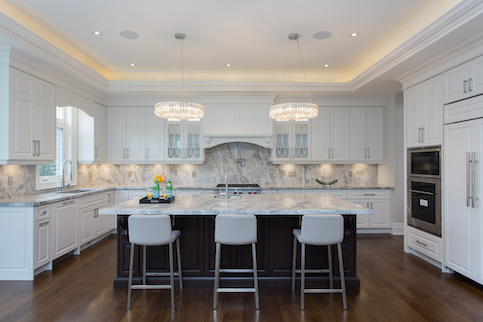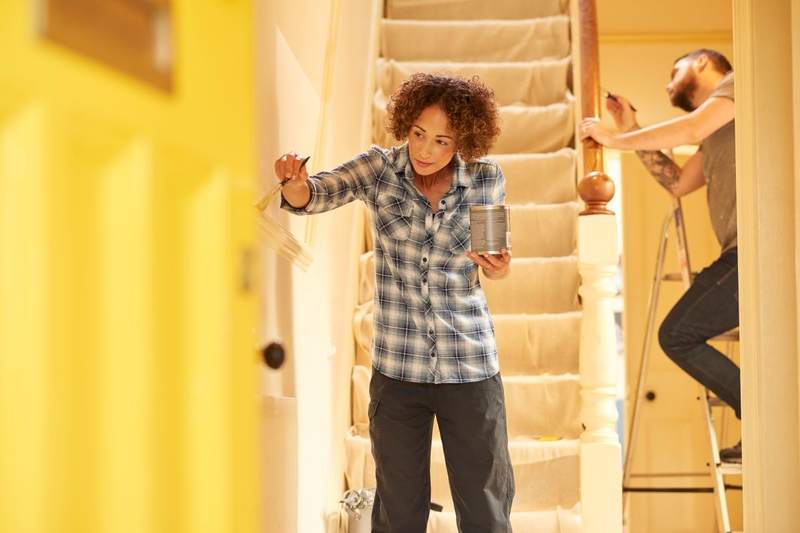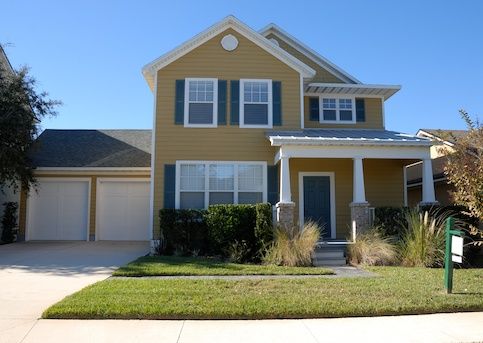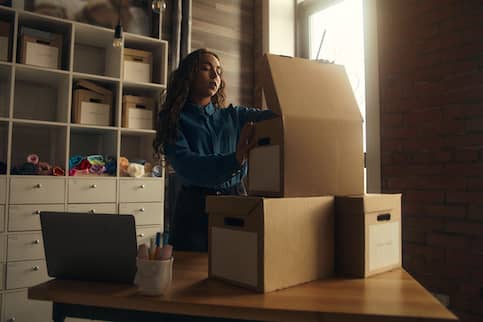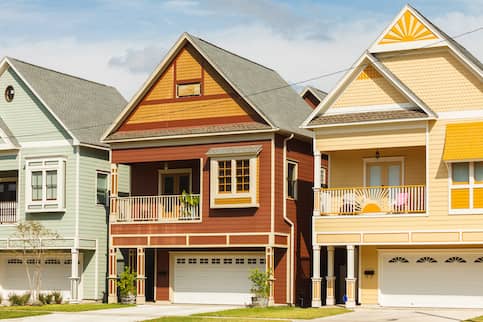If you’re in the process of preparing your home for sale, you might have wondered about making some repairs before listing your property on the market, but is it worth it to fix up your house? The answer to this question depends on the type of repairs you want to make.
Let’s take a closer look at what you should and shouldn’t fix when selling a house.
Is It Worth Fixing Up A House To Sell?
Some first-time home sellers may feel that the more perfect their house is, the less time it will take to find a buyer. While having a clean and aesthetically pleasing home can speed up the process, it doesn’t mean you need to fix every small issue before selling.
One of the best ways to determine if making repairs is worth the effort is by talking to your REALTOR® or real estate agent. They can provide you with advice on what should be done now or what can be left as is. Not to mention, your agent will probably have a general idea of what upgrades and fixes can yield the highest returns.
In most cases, they’ll likely recommend repairing anything that is health and safety related as well as anything that is obviously broken. These types of repairs can be well worth the cost of material and labor and can lead to a bigger return on investment when selling your home.
See What You Qualify For
Buy A Home
Discover mortgage options that fit your unique financial needs.

Refinance
Refinance your mortgage to have more money for what matters.
Tap Into Equity
Use your home’s equity and unlock cash to achieve your goals.
What Not To Fix When Selling A House
Making some types of repairs to your home before you list it for sale can be beneficial while others can be a waste of time and money. Figuring out what projects to take on depends on the current state of your house and how you plan to sell it.
Depending on the situation, you may be able to forgo these home repairs.
Minor Home System Issues
Some types of electrical, plumbing or HVAC problems can be considered small enough to ignore. For instance, such things as upside-down outlets, faulty switches, old air conditioning units or slow-filling toilets probably won’t discourage interested buyers. This means that you can probably leave these issues alone and focus your efforts on bigger projects.
However, if your house has any issues that can create hazards, you’ll need to get those repaired as soon as possible. Frayed electrical wires, leaking pipes or a broken furnace can create an unlivable home that could scare away prospective buyers.
Outdated Appliances
Another upgrade homeowners can avoid is replacing their out-of-fashion appliances with newer models. Even though a shiny, stainless-steel oven or fridge can make a kitchen feel state-of-the-art, you likely won’t see much return on your investment. In many cases, buyers would also rather have the chance to pick out their own appliances with the features they desire.
If you do have a broken appliance, make sure to list it in the Seller’s Disclosure. Or if you want to replace it, consider buying one second-hand or during a sale to help keep your costs low.
Windows Or Window Coverings
If you live in an area of the country with extreme temperatures and a lot of sunshine, your home may have windows with broken seals or yellowed trim. While both of these issues can be eyesores, they don’t harm the window’s energy efficiency. Replacing a single window can cost hundreds of dollars and shouldn’t affect the purchase price of your home in most cases.
While we’re on the subject of windows, you can also leave your current coverings intact or even consider removing them. For example, if you have broken blinds on some of your windows, you can opt to remove them to let in more sunlight. Having a well-light home will go a long way in impressing home buyers.
Worn Or Old Flooring
The type of flooring a homeowner chooses for their house depends on personal preference. Some people want hardwood while others prefer tile or carpeting. This is why some real estate professionals may recommend you leave your current flooring in place. It could be a waste of money to install new flooring that a buyer would end up replacing later on.
However, if you currently have carpeting that’s stained or has a strong odor, you might want to hire a cleaning company instead of spending money on replacing it. Some buyers could be deterred if your carpeting has an overwhelming smell or numerous stains.
View Your Refinancing Options
See recommended refinance options and customize them to fit your budget.
What To Fix When Selling A House
While you can probably get away with skipping the above repairs, there are some aspects of your home you should probably consider fixing.
Landscaping And Lawn Care
The first thing a buyer sees when they visit your property will be the exterior of your home. That means if your house is lacking in curb appeal, you might have a hard time selling your property.
The appearance of your landscaping and lawn care is one of the most important factors that affect property value. So, if you plan on listing your house for sale, you should spend some time weeding flower beds, laying down new mulch, seeding bare patches and even painting your front door. Small projects like this typically don’t take a lot of time or money and can significantly improve the curb appeal of your house.
Walls And Ceilings
Do your walls and ceilings have any holes, scratches or other cosmetic damage that could catch the attention of a potential buyer? If so, this is another repair you should consider to help secure a home sale. Repairing holes and filling scratches can make your home feel well-maintained and tidy.
If you have rooms with bold colors, like red or yellow, you can also consider painting your walls with a neutral color. It might not be a deal breaker for some buyers, but paint colors such as off-whites, light grays or beiges can help make your home feel bigger and improve the appearance of poorly lit areas.
Major Home System Issues
Even though some HVAC, plumbing and electrical problems can be overlooked, that doesn’t mean larger issues can be neglected.
Before listing your home, consider getting a home inspection done and reviewing the inspection report for any notes on major concerns the inspector had. If a home inspector notices you have issues like an inefficient air conditioner, a damaged pipe or a faulty electrical panel, you’ll need to have those repaired before selling your home.
Health And Safety Concerns
Along with major home systems, you’ll also need to consider any issues that create health and safety concerns. This category of repairs is important for several reasons, one of which is that home buyers who use a government loan can only buy properties that meet the inspection guidelines set by the Department of Housing and Urban Development (HUD).
If your house has a leaky roof, poor ventilation, pest infestation, standing water or mold, the buyer’s lender will not approve their loan. You’ll probably have a hard time finding a potential buyer with any of these issues as well. That’s why it’s vital your house has no outstanding health or safety concerns before you begin the home selling process.
Uncompleted Renovations
One of the best parts of homeownership is being able to complete your own renovations and upgrades, but if you have any unfinished projects, you should make sure they’re done before listing your house.
Some home improvements like upgrading your kitchen or bathroom can justify a higher asking price. However, if you won’t be able to complete a project before you sell, you should probably skip it. Just like with flooring and new appliances, buyers may have their own preferences on how they want to redo a space.
FAQs About What You Shouldn’t Fix When Selling A House
Learn more about what should and shouldn’t be done before selling a house with answers to these commonly asked questions.
What renovations won’t increase my home’s value?
These renovations could make your home harder to sell:
- Building a swimming pool
- Converting a garage into a living space
- Adding wallpaper to a room
- Constructing a sunroom
What renovations will increase my home’s value?
Some of the best home improvements that can increase your home’s value are:
- Painting the exterior of your home
- Refinishing or installing hardwood floors
- Replacing old garage doors
- Adding more living space
Will staging my home help it sell?
Yes, staging your home can impact how fast it takes to sell. According to the National Association of REALTORS® (NAR), 82% of buyer�’s agents said a staged home made it easier for their clients to envision living in the space. Another 23% of listing and buying agents said that staged homes received offers that were 1% – 5% higher than the offers made on similar unstaged homes.
What is the most common reason a house doesn’t sell?
One of the most common reasons why a house hasn’t sold is due to pricing. If your home has sat on the market for longer than the average amount of days, you can discuss lowering the asking price with your agent. They can conduct a competitive market analysis (CMA) to calculate a fair and attractive price for your house.
Do I have to make repairs if I’m selling my house as-is?
If you want to sell your property as-is, then potential buyers will know you’re not planning on making repairs and you can forgo doing the above fixes. However, buyers may still ask for a home inspection so they can get a better idea of what may need to be done after they buy the property.
The Bottom Line
Knowing what not to fix when selling your home and which projects should be completed can make the selling process go more smoothly. And by taking the time to improve your home’s curb appeal, livability and aesthetic, you can help speed up the time it takes to find a buyer.
And if you’re just starting the home selling process, learn how to stage your house with our budget-friendly home staging tips.
Ready for a change?
Find top-rated movers and compare multiple quotes on HomeAdvisor.

Hanna Kielar
Hanna Kielar is a Staff Writer for Rocket Companies with a focus on personal finance, automotive and personal loans. She has a bachelor's degree in professional writing from Michigan State University.

